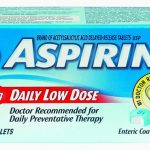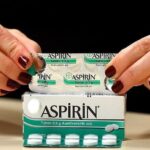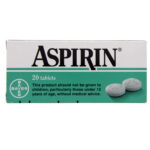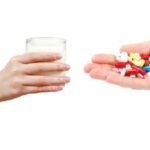Why You Should Take Your Aspirin With Milk

Milk is a good source of many essential nutrients, including calcium, protein, and vitamin D. Many people see it as a vital part of a balanced diet. Others, however, cite various reasons for choosing not to consume it. The nutritional breakdown of milk depends on the fat content and whether or not the manufacturer has enriched it. Nowadays, many manufacturers in the United States fortify their milk products with extra vitamins.
Milk is one of the best and most widely available sources of calcium available. One cup (237 mL) of cow’s milk has 306–325 mg, depending on whether it’s whole or nonfat milk. The calcium in dairy is also absorbed very well. Calcium is a mineral most often associated with healthy bones and teeth, although it also plays an important role in blood clotting, helping muscles to contract, and regulating normal heart rhythms and nerve functions. About 99% of the body’s calcium is stored in bones, and the remaining 1% is found in blood, muscle, and other tissues. Additionally, milk is a good source of protein, vitamin A, and vitamin D.
What is aspirin?
Aspirin is a salicylate that works by reducing substances in the body that cause pain, fever, and inflammation. It is a common drug for relieving minor aches, pains, and fevers. People also use it as an anti-inflammatory or a blood thinner.
People can buy aspirin over the counter without a prescription. Everyday uses include relieving headaches, reducing swelling, and reducing a fever.
Taken daily, aspirin can lower the risk of cardiovascular events, such as a heart attack or stroke, in people with a high risk. Doctors may administer aspirin immediately after a heart attack to prevent further clots and heart tissue death.
Aspirin should be used for cardiovascular conditions only under the supervision of a doctor.
Daily aspirin therapy may be used in two ways:
- Primary prevention. This means you’ve never had a heart attack or stroke. You’ve never had coronary bypass surgery, coronary angioplasty with stent placement, or blocked arteries in your neck, legs or other parts of the body. But you take a daily aspirin to prevent such heart events. The benefit of aspirin for this use has been debated.
- Secondary prevention. This means you’ve already had a heart attack or stroke, or you have known heart or blood vessel (vascular) disease. You’re taking a daily aspirin to prevent heart attacks or strokes. The benefit of daily aspirin therapy in this situation is well established.
Should you take a daily aspirin?
Don’t start taking a daily aspirin without talking to your health care provider. While taking an occasional aspirin or two is safe for most adults to use for headaches, body aches or fever, daily use of aspirin can have serious side effects, including gastrointestinal bleeding.
Your health care provider can give you details on the pros and cons of daily aspirin therapy and whether it might help you prevent a heart attack or stroke.
In general, as a person ages, the risk of heart attack and stroke increases. But the risk of bleeding from aspirin goes up even more. So:
- In people who have a low risk of heart attack, the benefits of taking a daily aspirin don’t outweigh the risks of bleeding.
- The higher the risk of heart attack, the more likely it is that the benefits of daily aspirin therapy are greater than the bleeding risks.
Because of bleeding risks, some recent guidelines say that people age 60 and older without known heart or blood vessel (vascular) disease should not start taking a daily aspirin to prevent a first-time heart attack or stroke. However, guidelines vary among organizations. Other recommendations say to avoid starting daily aspirin therapy after age 70.
If you’re between ages 60 and 69, consider talking with your health care provider about daily aspirin therapy and how it may affect you.
Daily low-dose aspirin therapy may be recommended for the primary prevention of heart attack or stroke if:
- You’re between ages 40 and 59 and you’re at high risk (10% or greater) of having a first-time heart attack or stroke within the next 10 years.
- You haven’t had a heart attack, but you’ve had coronary bypass surgery or a stent placed in a coronary artery, or you have chest pain due to coronary artery disease (angina) or any other medical condition where aspirin is proved to prevent heart attacks or stroke.
- You’re younger than 60 and you have diabetes and at least one other heart disease risk factor, such as smoking or high blood pressure.
If you’ve had a heart attack or stroke or you have known heart disease, your health care provider may recommend that you take a daily aspirin to prevent heart attacks or strokes unless you have a serious allergy or history of bleeding.
Why you should take your aspirin with milk?
Taking your daily dose of aspirin with a glass of milk is not only safe, but it can also significantly reduce your risk of dying from cancer, according to a study published in Lancet. Other evidence indicates that calcium in milk might enhance the drug’s beneficial effects. Scientists have stopped short of urging all healthy people to take aspirin, which is known to increase the risk of internal bleeding.
According to the lead researcher Professor Peter Rothwell of Oxford University, “it is worth people discussing it with their doctors”. Someone would need to be taking aspirin for five years or more to benefit. Those aged 45 to 70 would benefit because people aged over 70 have a greater risk of internal bleeding. “It has bigger effects on some and smaller on others,” he said.
The findings of the study involving 25,000 patients appear in the medical journal today and are regarded as major breakthrough.
The benefit was seen in people with cancer affecting the stomach and bowel, the esophagus, the pancreas, the lungs, the prostate, the bladder, and the kidneys.
During the trials, patients were taking at least 75mg of aspirin every day for between four and eight years. Significant benefits began to appear after five years of follow-up, with death rates for all cancers falling by 34pc and for stomach and bowel cancers by 54pc.





